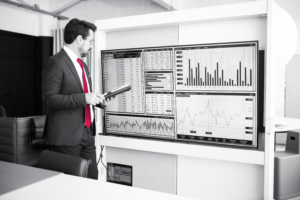How Big Data Can be Used in the Automotive Industry
Big data is disrupting everything it touches, but automotive is probably one of the top industries that enjoy the benefits and leverages it provides to the fullest. The applications of big data in the automotive industry are numerous and each of them seems to launch a wholesome new niche within the market. Let’s explore the opportunities.
The General Impact of Big Data Analytics in the Automotive Industry
What industry doesn’t use Big Data these days? Surprisingly, there are still plenty of them; however, they might be missing out on a lot, as new technologies sprint forward really fast. Luckily, we are now going to talk about custom automotive solutions based on big data, and that is definitely something interesting and truly progressive.
There are so many ways of using big data in this area it’s hard to even imagine, which is why there are so many myths that have very little in common with reality. But we know better than to listen to the rumors. Let’s look at some examples to get a general idea about the impact of big data on the automotive industry, just so we are ready for artificial intelligence using its power to overtake humans (just kidding!).
Car manufacturers have been using big data for a while, already, designing and building custom automotive solutions to advance customers’ experience and leverage competitive advantages. It allows for improvements in the quality of vehicles, making them safer, enriching driving experiences, and increasing the level of service. Basically, it is used both internally and externally. It is actually quite easy because, in this case, the data may be accumulated from different sources simultaneously: from care, its driver, the surroundings, and, of course, from special devices.
Huge amounts of data are being generated hourly, and it sure has to be put to good use. Accumulating all this data has become more and more possible due to the development of the Internet of Things. In 2013, it was predicted that, by 2020, there will be more than 40,000 exabytes of data generated by objects connected to the internet. Now, it looks, even more, real; not only do we have phones and tablets connected all the time, but also bigger gadgets such as fridges or cars.
With the development of AI, more unbelievable ideas that we’d previously only seen in science fiction books are becoming real.
Big Data for Connected Cars
There are not many of them yet, but the technology is taking us towards fully connected and automated vehicles (or at least we hope it is!). Currently, standard, non-connected car information is stored locally, meaning that the car does not interact with any server to do anything that connected cars can do, for example:
- Update maps automatically,
- Choose the best route,
- Adjust internal climate based on weather conditions,
- Analyze engine efficiency,
- Update a music playlist.
It’s true that connected cars are going to be a different story, and not just for entertainment purposes, but for safety and efficiency, as well. Car manufacturers will be able to monitor engines, update software, and control powertrain performance, even remotely. This means more mobility and definitely more safety for the owner.
Vehicle Fleet Management and Automotive Big Data Analytics
Big data in fleet management is likely to become a huge benefit for businesses. Almost any company has vehicles that are used for different tasks, and all of them need to be controlled and coordinated somehow. It is not so hard with ten cars, or even fifty, but what if there are hundreds or thousands of them? This is where Big Data might be of huge help.
Some drivers are speeding, some of them are using brakes improperly, and some of them get stuck in traffic when there are better options to get to their destination. Automotive data analytics can help solve all these issues by gathering big data from the sensors and analyzing it properly, according to the pre-set requirements.
Over time, such technologies will be used more and more. They will help maintain cars’ peak performance and also save money by saving vehicles from misuse and bad treatment.
Big Data for Automotive Mass Market
There are many big data automotive use cases. Even for regular drivers who have nothing to do with technology (consciously), everyone will benefit from it. Imagine a driver who isn’t mindful of the needs of their car. What if the oil needs to be changed or a sensor doesn’t work properly? This might be a confusing situation that will take the driver’s time and effort. In the meantime, with Big Data analytics, the car manufacturer will be able to inform him/her right away and, what’s even more important, remotely.
Consumer behavior analytics will also bring value. The companies will be able to find more distinctive correlations between behavioral patterns of different people, in order to provide a more personalized experience for their customers. For example, you will have a completely personalized GPS navigator built into your car to lead the way to your most favorite restaurant, or the most convenient gas station, etc.
Big Data for Custom Car Insurance
Predictive technologies can be very helpful for insurance companies. Not only will they be able to use data to predict the behavior of the driver, but also monitor driver safety. Of course, not everyone is going to agree on being monitored while driving, especially when it concerns those who enjoy speeding occasionally or taking advantage of empty roads to turn where it’s prohibited. At the same time, safe drivers who don’t mind proving their driving disciplines might obtain better discounts, thanks to data from connected cars.
It can also be very helpful in the event of an accident. Big Data is way more reliable than stories from witnesses or even video materials. False claims will be reduced significantly, making it easier for legal authorities and insurance companies.
Big Data-Based Roads and Infrastructure Construction
The use of analytics in the automotive industry concerns not only cars but also their surroundings. Almost every road has stoplights, occasional construction sites, and different kinds of infrastructure that can be a source of Big Data for passing cars. Industry technology cannot just leave it out of the picture.
The question is how can this data be used after it’s been analyzed? Many scientists have worked to solve this question. For example, Big Data may lead to better-organized traffic flows or for building rest zones where they are really needed. In places of high accident concentration, more stoplights can be installed.
Navigation systems will work better without ever leading drivers down a one-way street in the opposite direction. Improved alarm systems will be able to alert people about weather conditions, construction, or sharp turns. In the long run, all of this serves human safety and convenience.
The General Impact of Big Data Analytics in the Automotive Industry
Not so long ago, it was predicted that, in 2020, connected car services will reach about $40 billion in annual revenue, based on the hosting of different sorts of applications, making drivers’ lives safer and smarter in so many ways. Nowadays, this prediction seems a bit underestimated as the market develops even faster than you think!
New modern cars can give their owners many new benefits, thanks to Big Data analytics. Many manufacturers start implementing sensors on cars that, at first, were not planned as connected vehicles; however, even though it’s not a native solution, it is a solution, nonetheless.
There are already:
- Route monitoring systems alerting drivers about traffic jams,
- Weather alerts warning drivers about potential hazards,
- and Distance alerts that help while parking a car.
Some of these are accepted by modern people as trivial, or something that everyone is used to by now; however, all these benefits are really available thanks to specifically Big Data analytics, telematics, and route optimization systems, OBD electronics and embedded solutions.
Contact our team at learn@cprime.com for more information.



